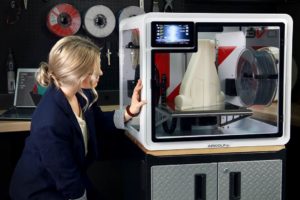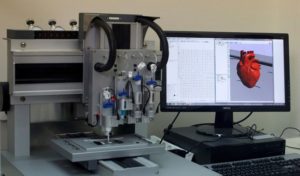This posting is partly an exploration in how language evolves and sometimes has consequences we weren’t expecting. If that doesn’t interest you, feel free to move on.
Actually, no — read it anyway… 🙂
There’s a term much in use these days: “3D Printing.” I have been holding that this term was being grossly misused, though when trying to explain why to someone I found I couldn’t defend my position. Which is at least half the reason for explaining things out to some one else, yes? To figure out if your idea is actually defensible or not?
Turned out I couldn’t defend it, because my position was based on an odd misunderstanding, or perhaps over-understanding of the word “print.” I say over-understanding because… well… keep reading.

The official seal of King James VI. Now that’s printing! Imprinting… impressing… something, dang it.
The word print originates from (at least) the Latin word premere, which is to press, as in to press a seal or official marking upon a document or other object as a way of validating or lending official status to the thing. A King’s seal, for example, or (in the case of Latin) a Senatorial or Imperial seal.
Press.
Then around 1440 the Printing Press was invented in Europe by good old Gutenberg (and at least 2 centuries earlier in China by folks now unknown — except possibly inside China). Given that “printing” comes from the Latin for press, a “printing press” seems like a redundancy, doesn’t it? A press press. Oh well. Language is rarely rational(1).
In fact, of course, the word was changed by the mere fact of a new gadget that significantly changed how documents, books, and such are copied(2) so the word’s usage changed.
Ok, skipping advances in printing presses, machines like the typewriter(3) and even the actual invention of “type” (and some how “type” turned into “fonts”, but we’ll skip that) we’ll just jump over to the word processor. Now the same gadget (sort of) composes and “prints” the material. And then comes the 3D Modeling Software, for creating cars and houses and flower vases on your computer, but going from the model on the screen to a Real World version of whatever you just created was tough. “Printers” wouldn’t do that, of course.

The very same model typewriter that Sam Clemens used to write the first-ever novel written completely on a typewriter. Sophisticated automation. No, don’t laugh.
So starting around 1992 (plus or minus some) various ways and means of creating an actual physical model of what was crafted on the computer were invented. Among other things this included a version of 3D printing still very much in use today. Some very large manufacturers, such as car companies and aerospace firms, had a fancy method for creating physical prototypes from a computer model. It was a tank, filled with a special liquid plastic and laser beams would be flashed into the tank; where the beams intersected the liquid would turn solid. Thusly… an early 3D printer.
(Not that early, as, in fact, that method is still in use today, though with some refinements, as you might expect.)
Look up on eBay some time under “3D Printer” and you will find the most amazing collection of gadgets. Some of them do not work, or work only very badly (which, to me, is the mostly the same thing) and some of them work very well. They range in price from a $100 (more or less) up to many thousands, depending on whether it really works or not, how long it takes to create a thing and how many colors and types of materials it can handle.

A nice machine. The low end of what is actually called an “industrial” 3d printer. I don’t think it quite qualifies and that naming it thus is merely an attempt by the “3d printer industry” to aggrandize the products into more than they actually are — so far. Still, that is a nice machine.
Where I got fouled up in the conversation I alluded to at the start was in a discussion about how medical technology is “3d printing” organs and body replacement parts, using actual cells. Cells grown in using some of the spin off technologies from research into stem cells(4), and then a “stream” (as it were) of such cells is directed (cell by cell, apparently) by fancy “3d printers” that can actually tease together things like replacement livers. Any organ that isn’t terribly organized, say. A brain, for instance, is not possible, perhaps ever, because it’s “content” is too dependent on its actual structure, but certainly not right now, at least. Kidneys have been done. Even a “printed” bladder was recently successfully transplanted.

That is *not* a machine that can make a functioning, replacement heart. But we are heading in that direction. This is, however, a “medical grade 3d printer.” So there…
Why was I objecting to calling these things “printed?” Because it feels more like 3d nano manufacture, to me, not printing. If we call that “printing” then what do we call 3d nano manufacturing? Well… I guess the world has already voted: we’re going to call it “3d printing.” Piffle.
In a way, it’s like my objection to the current use of the term “artificial intelligence” or “AI.” What is being discussed usually is a better human / computer interface is all, not AI. At best you might call it machine intelligence, or machine learning. We used to know this. Back in the 80’s these terms were all known and understood. More or less.

People get concerned that an AI system will turn out to be behind CoVid and thereby the extermination of the useless 90% of the population (I really do get these conversations happening in my direction, and not just once, either). People also apparently worry that the “uber elite” (which seems to be the current term for what in the 90’s was sometimes called “the round table of nine”) will use AI to control the Herd for its own uses.(5)
Well…
A computer that can understand what you say and turn that into a Google Search and give you the top answer (which in my experience is almost never the answer I’m looking for, by the way) is not going to take over the world. It’s just a better keyboard. Trust me. In fact, a computer or advanced network of computers that “wakes up” isn’t going to take over the world either. I mean, worst case, you pull the plug out of the wall. Let’s get real.
But I was discussing linguistics. “AI” is now a pre-empted term. Should a computer actually, really gain consciousness(6) what will we call it? Other than Fred or Freida, I mean. AI will be what we call the voice operated phone tree at Microsoft, the one that discourages your calling in the first place because it’s so totally annoying. That’s AI? (I call it really poor software, but that’s me.) What will we call it, now that “AI” has been pre-empted from its real meaning.
But back to 3D Printing. I recall more than one of the early articles discussing the subject likening it to the “replicators” on Star Trek. Get real. Not even. Not even a little bit. The ability to form some hot plastic into various shapes is not even a little bit related to manufacturing atoms out of energy and positioning them precisely and doing it in seconds.
Then there’s the “3D printed houses” now, which are really just partially built with a computer controlled concrete-spewing hose and nozzle arrangement. Ok, the computer directed the stream of concrete from the cement mixer [puttee-puttee] and laid a foundation or even some walls. Yeah! Nice work.

This one-piece concrete house was “3d printed.” I doubt very much that includes the windows. Unless some one from the future came by and gave the computer the secret formula for “transparent concrete.” Still, that *is* an accomplishment. A two story structure, that will have far lower energy demands, mostly extruded by a computer controlled gadget. Low cost; low energy use. Very nice. (The extrusion nozzle can be seen at the top of that scaffolding-like structure.)
How is that 3d printing, though? It’s not. Because “print” comes from the Latin meaning to impress, as in to impress a seal or the King’s Mark upon something. I don’t see an official seal here. Maybe on the back side of the building? It certainly doesn’t mean “to assemble by extrusion of materials.”
Oh alright. I surrender! It *is* printing. Because it is. And that’s about all one can say here. That’s often the case with linguistics. “Because that’s how it came to be used,” is often the only explanation for language. Words have only the meaning that Group Agreement gives them(7).
The term is now fixed in the linguistic banks of the Herd, and it means what it means: any computer-controlled assembly of real world objects == 3D Printing.
Though I suspect if Tony (not Freida), my human-formed household-handy-man and general servant robot were able to assemble the latest what-ever from Ikea I doubt we’d call it 3D Printing in that case, though that would certainly qualify under the above definition.
Did you know that hostile comes from the Latin word hostis which simple means stranger?? Wow. What’s that say about our silly culture?
Definitions. Sheesh…
[30]
(1) Oops. I just gave away my punch line, there. 🙂
(2) Note: not written, but how copies were made. It was the invention of the personal computer / workstation that changed both crafting and producing copies of documents.
(3) Typewriter, which Sam Clemens (aka, Mark Twain) fell in love with the instant he saw one and wrote the very first book ever on a typewriter (around 1874, that was)
(4) Let’s not get into a stem cell flinging argument here about ethics or anything. Stem cells come from many sources now, and can even be “teased” out from your own normal cells, as needed. Besides, many countries are “making” organs now using the very things Americans so often object to (cause it’s much less expensive to do it that way), and then sell these products right back to eager American markets. So… who’s at fault here? Anyone? That’s another discussion and probably one not actually resolvable, as the arguments are rarely rational, but emotionally based — which does not mean they are wrong, by the way, just not subject to rational debate.
(5) What makes you think they need AI to that? Look around you. The Herd has never been easier to manipulate en masse than it is right now.
(6) I believe that to be impossible with out current technology, by the way — though I have thoughts on how it could be done — which I’m am not going to share, here or anywhere. Live with it. 🙂
(7) Of course, Lewis Carrol (that is, the Rev Charles Dodgson) would disagree. If you don’t follow that, then you’ve only demonstrated that you never read Alice in Wonderland and Through the Looking Glass. Shame on you. Read it. Don’t just watch the many movie version; they total miss the point. READ IT.